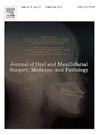用肿瘤相关免疫染色分析1例柯登综合征密码子130突变患者的多器官肿瘤病变:1例报告
IF 0.4
Q4 DENTISTRY, ORAL SURGERY & MEDICINE
Journal of Oral and Maxillofacial Surgery Medicine and Pathology
Pub Date : 2025-01-02
DOI:10.1016/j.ajoms.2024.12.020
引用次数: 0
摘要
考登综合征(CS),又称多发性错构瘤综合征,是一种罕见的常染色体显性遗传性皮肤病。我们报告一例53岁女性,通过磷酸酶和紧张素同源物(PTEN)基因测序诊断为CS,结果显示5外显子密码子130 (Arg130Ter)突变。右颊黏膜及舌部因误咬出现肿块。进行了切除活检,并通过免疫组织化学分析样本,以了解为什么口腔乳头状瘤病没有进展为恶性肿瘤。PubMed的一篇综述发现了21例具有Arg130Ter突变的CS。没有观察到对女性的偏爱,男性和女性之间的分布是平等的。Arg130Ter突变患者的甲状腺、乳腺和泌尿生殖系统肿瘤发生率高于所有CS患者。此外,与所有CS患者相比,Arg130Ter突变患者的诊断年龄更小。口腔黏膜病变组织病理学检查显示乳头状纤维上皮增生。免疫组化显示PTEN、MIB-1和S-100呈阴性,但部分上皮细胞中p53和Bcl-2呈阳性。这些结果表明,症状出现在更年轻的年龄,往往更严重,p53是抑制CS中Arg130Ter突变患者恶性转化的一个因素。本文章由计算机程序翻译,如有差异,请以英文原文为准。
Multiple organ tumor lesions analyzed using tumor-related immunostaining in a patient with codon 130 mutation of Cowden syndrome: A case report
Cowden syndrome (CS), also known as multiple hamartoma syndrome, is a rare autosomal dominant genodermatosis. We report a case of a 53-year-old woman diagnosed with CS through phosphatase and tensin homolog (PTEN) gene sequencing, which revealed a mutation in codon 130 of exon 5 (Arg130Ter). A mass appeared on the right buccal mucosa and tongue owing to misbiting. An excision biopsy was conducted, and the sample was analyzed via immunohistochemistry to understand why oral papillomatosis did not progress to malignancy. A review of PubMed identified 21 cases of CS with Arg130Ter mutation. No predilection for women was observed, with an equal distribution between men and women. The incidence rates of thyroid, breast, and urogenital neoplasms in patients with Arg130Ter mutation were higher than those in all patients with CS. Additionally, patients with the Arg130Ter mutation were diagnosed at a younger age than that in all patients with CS. Histopathological examination of the oral mucosa lesions revealed papillary fibroepithelial hyperplasia. Immunohistochemistry revealed negative results for PTEN, MIB-1, and S-100, but positive results for p53 and Bcl-2 in some epithelial cells. These results suggest that symptoms appear at a younger age and tend to be more severe, with p53 as a factor that suppresses malignant transformation in patients with Arg130Ter mutation in CS.
求助全文
通过发布文献求助,成功后即可免费获取论文全文。
去求助
来源期刊

Journal of Oral and Maxillofacial Surgery Medicine and Pathology
DENTISTRY, ORAL SURGERY & MEDICINE-
CiteScore
0.80
自引率
0.00%
发文量
129
审稿时长
83 days
 求助内容:
求助内容: 应助结果提醒方式:
应助结果提醒方式:


